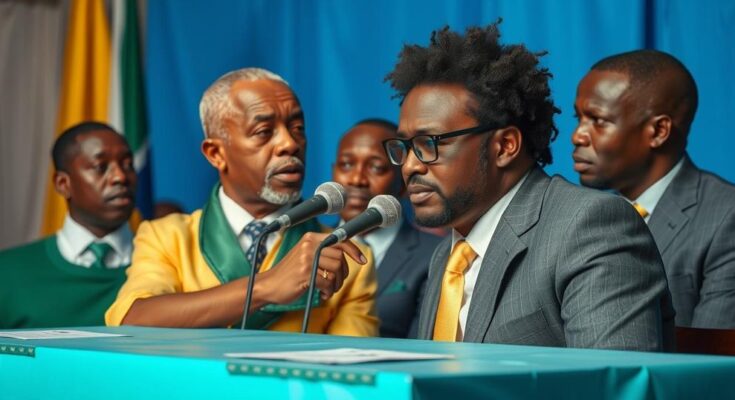The opposition leader in Comoros has condemned the legislative election results, citing allegations of fraud and a lack of transparency. The ruling party claimed substantial victories amid claims of ballot box irregularities. The opposition has decided against participating in the second round of voting set for February 16, amidst ongoing disputes over the election’s integrity.
In the Comoros, the leader of the opposition has publicly denounced the results of the recent legislative elections held on Sunday, claiming that they were severely compromised by fraudulent practices. Daoud Abdallah Mohamed, leader of the United Opposition coalition and former interior minister, articulated concerns regarding the integrity of the electoral process, citing widespread ballot box stuffing and discrepancies between registered voters and votes cast, with reports of more votes being recorded than actual registered voters in certain polling stations.
The elections, which were marked by a significant boycott from opposition factions, resulted in the ruling Convention for the Renewal of the Comoros (CRC) party winning 12 of the contested seats, as reported by the independent electoral commission of Anjouan. Despite a declared voter turnout of 70 percent, observers noted peculiar patterns, specifically in the Anjouan region, which is pivotal for both President Azali Assoumani and his associates, raising further questions about the authenticity of the vote.
The electoral process has been described as lacking transparency, prompting accusations of fraud that were rejected by President Assoumani, who called on the opposition to substantiate their claims. Notably, in Moheli, four constituencies featured uncontested races with the ruling party’s candidates, further limiting the election’s competitive nature. The opposition has stated their intention to abstain from participating in the forthcoming second round of voting scheduled for February 16.
The political landscape in Comoros has been tense, especially surrounding electoral processes. The opposition has consistently raised concerns over the integrity and transparency of past elections. President Azali Assoumani has been in power since 2016 and has faced accusations of manipulating elections to maintain his position. The legislative elections in question were held against a backdrop of significant opposition boycott and dissatisfaction with the ruling party’s governance, resulting in allegations of irregularities during the election period.
The rejection of the recent legislative election results by the Comorian opposition highlights ongoing tensions within the political framework of the nation. Accusations of fraud and the lack of competitive participation raise fundamental questions regarding the integrity of the electoral process. With a second round of voting approaching, the opposition’s decision to abstain further complicates the political landscape, potentially diminishing the legitimacy of the electoral process in the eyes of the public and international observers.
Original Source: www.barrons.com




